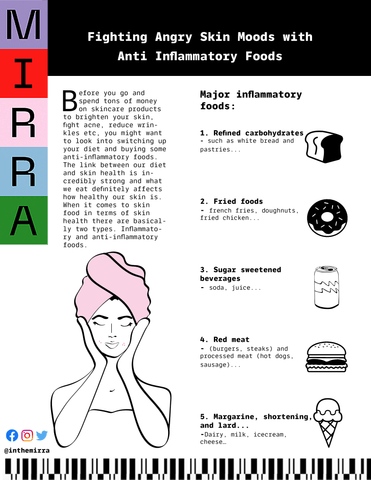Fighting Angry Skin Moods with Anti-Inflammatory Foods

Before you go and spend tons of money on skincare products to brighten your skin, fight acne, reduce wrinkles etc, you might want to look into switching up your diet and buying some anti-inflammatory foods.
Contents
2. Anti-inflammatory foods for your skin
Key Points
- Inflammation is an immune system response, but chronic inflammation leads to skin and body issues.
- Major inflammatory foods usually contain lots of sugar/carbs.
- For skin and gut health, a diet rich in fruits and vegetables, whole grains and omega-3 fatty acids is best.
The link between our diet and skin health is incredibly strong and what we eat definitely affects how healthy our skin is. When it comes to skin food in terms of skin health there are basically two types. Inflammatory and anti-inflammatory foods.
Inflammation is an immune system response to foreign objects within the body like pollen or a virus. Your body creates a barrier, via swelling the cells between you and the substance in order to keep it from spreading. Inflammation is a normal function in our bodies, however chronic inflammation (which can be caused by diet) can cause all types of problems

The Western diet has been extensively researched to discover its health implications. The western diet is characterized by “high calorie uptake, high glycemic load, high fat and meat intake, as well as increased consumption of insulin- and IGF-1-level elevating dairy proteins.” Basically lots of bread, fried food, red meat and cheese. Using this research we have found that some foods have inflammatory effects. Here's a list of foods to avoid or limit as much as possible:
Major inflammatory foods
- Refined carbohydrates - such as white bread and pastries...
- Fried foods- french fries, doughnuts, fried chicken...
- Sugar sweetened beverages- soda, juice...
- Red meat - (burgers, steaks) and processed meat (hot dogs, sausage)...
- Margarine, shortening, and lard...
- Dairy, milk, ice cream, cheese… There have been a few different studies specifically looking into the relationship of dairy and acne, one study found that women who drank 2 or more glasses of skim milk a day were 44% more likely to have acne than others. While many studies have shown there to be a link between acne and dairy products, it is important to remember that all their data is correlational and not causal meaning that dairy might not actually be the underlying cause.
If you were wondering what “high glycemic load” meant look no further! Many high glycemic foods are also inflammatory, but the glycemic level of a food does not indicate how healthy it is. A high-glycemic food is one where the carbohydrates are easily turned into glucose, the sugar our bodies use for energy.

The issue with high-glycemic foods is that they often give us far more fuel than we need and too quickly which causes a lower amount of energy or even a “food coma.” This excess sugar is also very easy for our bodies to store as fat, which is usually quite undesirable. Excess weight gain is also a contributing factor to inflammation. Here are some foods and their glycemic rating (on 0-100 scale “55 or lower is good, 70 or higher is bad”) to give you an idea of how foods rank:
- Potato = 78
- White bread = 75
- Udon noodles = 55
- Apple = 36
- Soybeans = 16
Anti-inflammatory foods for your skin
Understanding the process of inflammation and also how glycogen works we can then look at how our diet can affect skin. The skin is our largest organ (20% of your entire body!). It lives, regenerates and is sensitive to our diet. Studies have linked acne and diet due to the observation that acne is not found in aboriginal non-Westernized populations such as those in Papua New Guinea and Paraguay.
Investigators have examined the role of the Western diet, which typically corresponds to a high glycemic load diet. One study found that when treated with a mediterranean style diet (mostly nuts, fish and veggies) people had improved acne symptoms. Due to studies like this one, many physicians now recommend a diet rich in fruits and vegetables, whole grains and omega-3 fatty acids over omega-6 fatty acids.
Additionally, there are some foods that have been proven to be anti-inflammatory foods, some of these include:
- Fatty fish - salmon, mackerel, tuna, and sardines
- Tomatoes
- Olive oil
- Nuts - almonds and walnuts
- Green leafy vegetables - spinach, kale, and collards
- Fruits - strawberries, blueberries, cherries, and oranges
- Coffee

Having anti-inflammatory foods in your diet keeps the inflammation happening in your body to a minimum. While some inflammation is important to normal functioning, chronic (constant) inflammation is linked to many diseases including depression, cancer, heart disease, diabetes, arthritis, and Alzheimer's. In particular, anti-inflammatory foods like fruits and vegetables contain antioxidants which are great for your overall health and your skin.
Antioxidants have been found to promote anti-aging. Skin aging is another thing that is majorly impacted by diet and is directly linked to inflammation. If you want to boost up your anti-inflammatory foods, try cooking with turmeric which in addition to being delicious, also has anti-inflammatory properties. Supplements like fish oil which contains omega-3 fatty acids can also reduce inflammation within the body greatly.
Final Thoughts
Simply including a few anti-inflammatory is probably not enough to clear up your acne overnight. However, the benefits of completely switching to this type of diet could have major impacts on your skin and your overall health.

Written by Kiana St. Onge
UP NEXT:
Myth Busted: Is Drinking Room Temperature Water Better For You?
20 Signs of Burnout and How to Recharge
SOURCES:
- https://www.ncbi.nlm.nih.gov/pmc/articles/PMC4106357/
- https://www.health.harvard.edu/staying-healthy/foods-that-fight-inflammation
- https://www.ncbi.nlm.nih.gov/pmc/articles/PMC6115795/
- https://www.health.harvard.edu/diseases-and-conditions/glycemic-index-and-glycemic-load-for-100-foods
- https://inthemirra.com/blogs/news/benefits-of-turmeric?_pos=6&_sid=08f34bdcc&_ss=r






